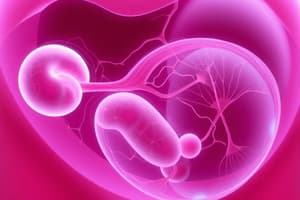Podcast
Questions and Answers
Discuss the role of hormones in human reproduction and how they regulate the menstrual cycle.
Discuss the role of hormones in human reproduction and how they regulate the menstrual cycle.
Hormones such as estrogen and progesterone regulate the menstrual cycle. These hormones are produced by the ovaries and play a crucial role in the development of the uterine lining, release of the egg, and preparation for potential pregnancy. The hormonal balance is essential for successful reproduction.
Explain the process of human reproduction, including the key stages and organs involved.
Explain the process of human reproduction, including the key stages and organs involved.
Human reproduction involves the fusion of a sperm and an egg to form a zygote. This process occurs in the fallopian tube, and the zygote then implants in the uterus where it develops into a fetus. The key organs involved are the testes and ovaries, which produce the gametes, as well as the uterus and fallopian tubes for fertilization and development.
Explain the process of fertilization and the genetic contribution of both the sperm and egg.
Explain the process of fertilization and the genetic contribution of both the sperm and egg.
Fertilization occurs when a sperm penetrates the egg, resulting in the formation of a zygote with genetic material from both parents. The sperm contributes the paternal genetic material, including the sex chromosome, while the egg provides the maternal genetic material. This genetic combination determines the traits of the offspring.
Flashcards are hidden until you start studying




